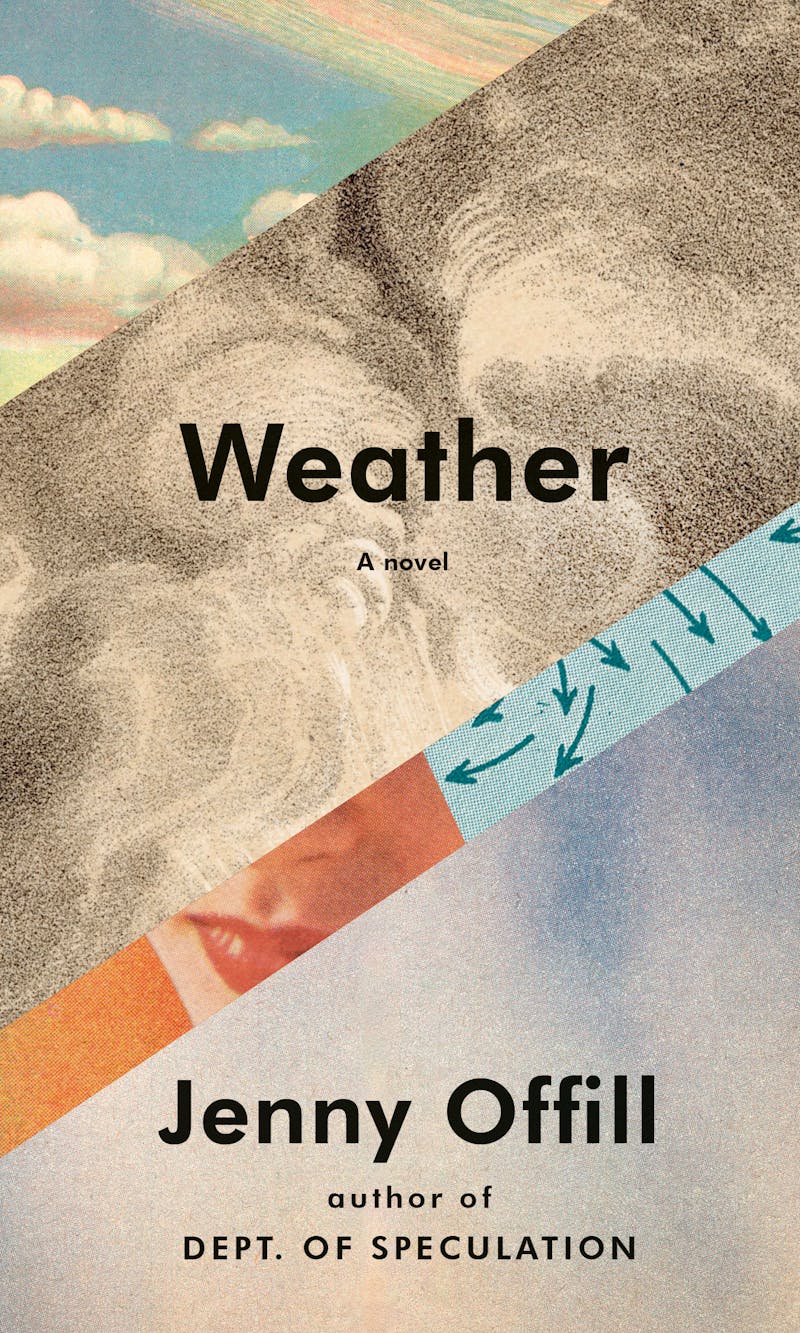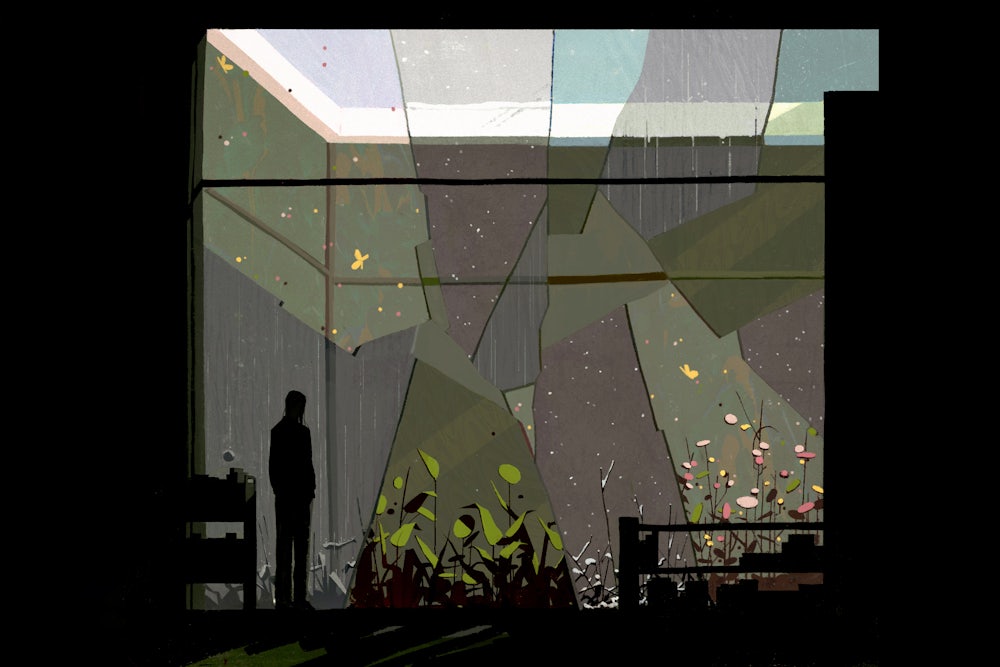I know a lot of people who think we are teetering on the edge of an apocalypse. This possibility feels so close, in fact, that many of the jokes about it have already worn thin from overuse. When is the meteor coming? people say. Or, The season finale of America is really wild. The one I keep telling is about moving to California. I came here, I said, because when the Big One hits, I want to fall into the sea right away. I have no interest in being around for the Cormac McCarthy portion of the proceedings. I do not want to find myself sorting through caches of tin cans and testing them for botulism, I tell people.

You can see how quickly this sort of joke spins into depression. The modern condition is to float above despair about climate change, political turmoil, and impending recessions because we have to, but also because the nature of our predicament—and here, by “our,” I mean those of us who live in and around the United States in the 2020s—is that we’re still waiting for the fatal blow. We live in the penumbra of the Big One, whatever it is, whatever it will be, and we are all like rabbits in a field, sniffing the air because there is the scent of lightning in the distance, but we can’t be sure how far away it truly is, or when it will hit us. We have to remain mobile, for now.
Jenny Offill’s aptly titled Weather is a dispatch from this realm of consciousness, vacillating between gallows and humor, almost always living in the space between both. But, though concerned with topical matters, it is not exactly what was once called a social novel. There’s neither much plot nor much character to speak of: A woman named Lizzie works as a librarian in Brooklyn, a job she holds although she does not have the proper credentials. Lizzie’s brother is depressed, but her marriage is solid, and her private, concrete troubles are few. She takes a gig with an old mentor, Sylvia, who runs a podcast for an audience obsessed with potential Armageddons. She answers Sylvia’s mail, which is filled with questions like, “How is the goodness of God manifested even in the clothing of birds and beasts?” or, “Do angels need sleep?”
That’s about all there is to say about the premise and plot—like most high-literary fiction of the 2010s, this novel is propelled by voice, not machinery. The narrator’s mood is, in a pleasing way, internally contradictory. She is full of anxiety, but she arrives at such a beautifully laconic mode of expression that the effect is lulling rather than unsettling. “Maybe I can stop having that dream now,” she’ll muse. “The one where my brother shows up to my apartment and says, Lizzie, can I die here?” There is an elegance even in her more depressing insights, like the following questions, offered early in the book, which I kept thinking about for days, going about my life:
Young person worry: What if nothing I do matters?
Old person worry: What if everything I do does?
Weather is written entirely in short, aphoristic flashes like these, the same paragraph-long little parables that Offill deployed to rapturous acclaim in her previous book, 2014’s Dept. of Speculation. That was a slow-moving disaster book, too, in its way: the chronicle of a woman feeling both strongly attached to a new baby and afraid that her attachment was getting in the way of her ambitions for herself. The mordant nature of her observations kept you reading, the humor bent in service of a bite. When a woman on the subway says the phrase “sleeping like a baby,” Offill wants “to scream for five hours in her ear.”
I once wrote that I thought this a great book. And yet, in the years since I recorded that reaction, Dept. of Speculation has come to feel slight. Not for the usual reason, that the subject is in any way small. The notion that we don’t take domesticity seriously in fiction became a commonplace assertion in the 2010s, and if what we are talking about is reputational currency, that was utterly true until quite recently. But winds shift. There has been an explosion of novels about subjects once thought flimsy—motherhood, female friendships—and those topics are the heart of groundbreaking work by, just as a few examples, Elena Ferrante, Sally Rooney, Rachel Cusk, and Susan Choi. These works are not ambivalent about their own importance—they believe they have a right to exist for their own sake.
Dept. of Speculation, by contrast, had a tentative quality, fed by the shortness of those paragraphs, the way observations would be cut off. Every thought was more venture than declaration. In a much-quoted passage, the narrator says she once thought she was meant to be an “art monster,” someone who doesn’t let day-to-day duties get in the way of her work. But “women almost never become art monsters because art monsters only concern themselves with art, never mundane things. Nabokov didn’t even fold his own umbrella. Vera licked his stamps for him.” It’s a trenchant observation, a feeling easily recognizable by any woman who has spent her life serving dinner without sitting down herself, wiping children’s noses, picking someone else’s laundry up off the floor. (Perhaps men can sympathize with this more now than they ever did, but it is still, in my experience, a specifically gendered sense of obligation. It’s still the case that many women don’t know who else will do these small tasks if they do not.) But that’s it, that’s all—after the joke about this arrangement under centuries of gender and power hierarchies, we move on. In another context, we’d say we kept scrolling.
This sense of fragmentation is far from new. For more than 100 years now, artists have asserted that modern consciousness is a fractured thing. At first it was industrialization, then war, that was shattering our consciousness, making us feel that the whole continuum for life was a perilous, contingent thing. Big events of consequence called into question the logic and order of existence. Now it feels as if the splintering of a human life comes in smaller pinpricks, the continuous distraction codified by social media companies, each founded by near-children who never realized they were reorganizing the way people thought just by providing a “platform” for jokes and the chronicling of the lives of household pets. Whereas the modernists might have thought fragmentation a shock to the system, now we are trained by all our time online to expect it and to be self-conscious about its effects.
We all know there’s something to worry about in succumbing to the franticness of it, of course, and particularly so in art. Even Offill seems to recognize this. Her narrator tells us at one point she doesn’t use social media. It makes her feel like a rat. “Pellet of affection! Pellet of rage! Please, please, my pretty!” But how does one keep a novel written in similar snippets from feeling exactly like that?
Weather itself has the beginnings of an answer. Set against the portent of mass calamity, even a fleeting form like Offill’s gets loaded up with significance. All the bad news here floats. Sometimes, that’s with humor. Reading that she should remember that everything and everyone she loves will pass, the narrator thinks to herself, “Aw, c’mon man. Everything and everyone I love? Is there one for beginners maybe?” But as the pages go on, a hypnotic lyricism takes over from the jokes. The speaker finds poetry even in recommendations for disaster supplies:
You must own small, unnoticeable items. For example, a generator is good, but 1,000 BIC lighters are better. A generator will attract attention if there’s any trouble, but 1,000 lighters are compact, cheap, and can always be traded.
Google that last passage and you will find it is a quotation from a Bosnian survivalist who posted his insights on Reddit. Other italicized passages like this turn up gems from Foucault, the Nobel prize-winning scientist F. Sherwood Rowland, and Democritus. In fact, there are a lot of quotations in this book—mostly attributed, but some hidden. (I had to look up that Bosnian quotation myself.) The effect, once you notice it, is of a collage.
This technique could draw accusations of a lack of originality. Thirteen years after Jonathan Lethem constructed his essay “The Ecstasy of Influence” out of quotes from other people’s work, it’s still possible to cling to the idea that art is first and foremost about invention. Or, at least, a wish that the author had put that much more of herself in the book, instead of holding her own insight at arm’s length by resorting to the insights of others.
The speaker in Weather may have a specific reason to express herself in this mode: She is a collector by trade, since she’s supposed to be answering the podcast mail. But even if she did not have the professional imperative, I suppose a lot of people are collectors right now. The instinct of a reader, in a time of calamity, is to read more. And when there is nothing you can do by way of unseating a politician, returning the Antarctic to a deep freeze, unlocking a cage at the border, you have to fall back on the old refrain about knowledge being power. Not because it necessarily is—but because without it there is truly nothing you can do but panic.
Early in the novel, Lizzie sees an expert on television who says that panic isn’t actually the natural response of most humans in an emergency. More typically, he claims, they freeze. They don’t process what’s happening. He says this is called the “incredulity response” and then adds, “Those who live move.” They run, but more than that, they gather. They collect supplies. And if those supplies, instead of being camp stoves and blankets and first aid kits, are only the tiny bits of wisdom one can glean from hundreds of years of human attempts to grapple with extinction, so be it. As the historian Timothy Snyder—also quoted here—advises, “If we enter a culture of denunciation, you will want to know the psychological landscape of your daily life.” Offill is trying to map just that.
